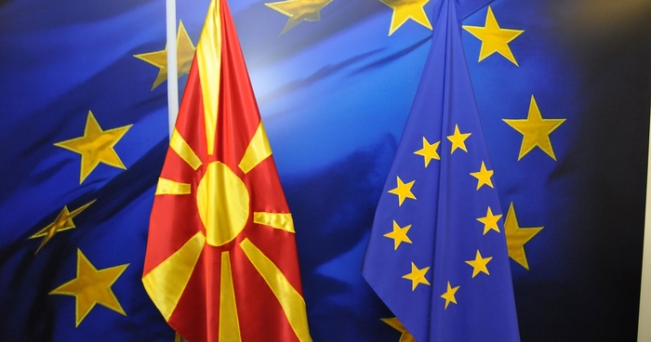Citizens support membership of the European Union, the majority believes it is a good and useful thing for the country, and remain optimistic about getting a date for spring negotiations.
This is shown by the latest results of the EUROMETAR survey of citizens’ opinion on issues related to European integration and trust in the institutions organized by the EUROTHINK Center for European Strategies.
Magdalena Lambovska from EUROTHINK, who presented the results of the survey, noted that the immediate impact of the French veto on the start of accession negotiations with North Macedonia was minimal on Macedonian citizens’ support for accession.
The majority of citizens, or 56.8 percent, cited non-implementation of reforms at home as the main reason for the failure to start negotiations, while the minority, about a quarter, cited internal developments in the Union. However, more than half of the citizens expect the start of negotiations in May 2020.
What is characteristic of the previous polls is that in less than two months, the percentage of citizens who rate the EU’s attitude towards the country as “unfair, excessive and blackmailing” has increased dramatically, due to the feeling of hopelessness. That percentage was 30.3 in October, and at the end of November this year it increased to 44.4 percent.
Magdalena Lambovska from EUROTHINK estimates that if this trend continues, it will affect citizens’ perception of the EU, and thus their support.
The poll shows that every fifth citizen believes that Macedonia has no friends in the international community, and according to citizens, the biggest “threats” to the country come from the neighborhood.
Asked which state or international organization is Macedonia’s biggest friend, 18.3 percent said none, 16.2 percent said Germany is the biggest friend, followed by Serbia with 11.8, the US with 9.7, Turkey 7, 4, EU 4.8 and Russia 4.7%.
When asked if there is a country or an international organization that poses a threat to the country, 36.2 percent said yes, and to the question what that state or international organization might be, 37.1 percent said it was Greece, 10.5 Albania, Bulgaria 8,8 percent, 5.5 percent Russia, 5.2 percent US, 4.7 percent Kosovo and 2.5 percent the EU.
The survey also covered the issue of citizens’ trust in the institutions, with citizens having the highest trust in the military with 52%, followed by the President with 44.9%, CSOs with 34.7% and the Government with 32%. The lowest is the confidence of the citizens in the judiciary and in the political parties, with 71 percent not trusting the judiciary.
As to whether EU membership of the country would be a useful thing, 67% said yes, and a similar percentage support NATO membership.
Of the citizens surveyed, 36.4% believe that the country can expect EU accession within the next five years, while 67.9% think that the country will join the Union within the next 10 years.
Asked whether the EU is the best alternative or whether the country should seek its own model of development outside the EU, 55% said yes, while 40.8% thought it was not the best alternative. Among those polled, DUI supporters with 82.5 percent believe the EU is the best alternative, with SDSM with 77 percent, while VMRO-DPMNE with 35.8 percent. Of those who think the country should seek another model outside the EU, 61.5 per cent are supporters of VMRO-DPMNE and 22.3 per cent of SDSM.
Lambovska thinks it is worrying if young people lose hope in the EU, and that young people are too divided on this issue.



